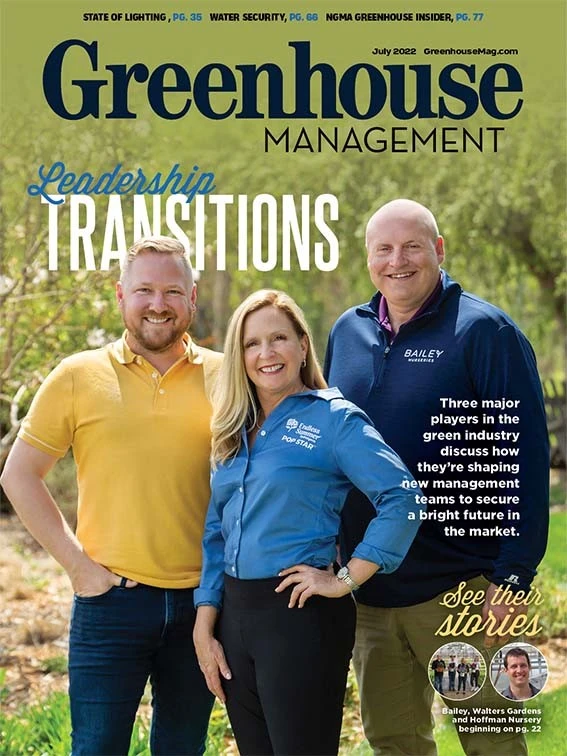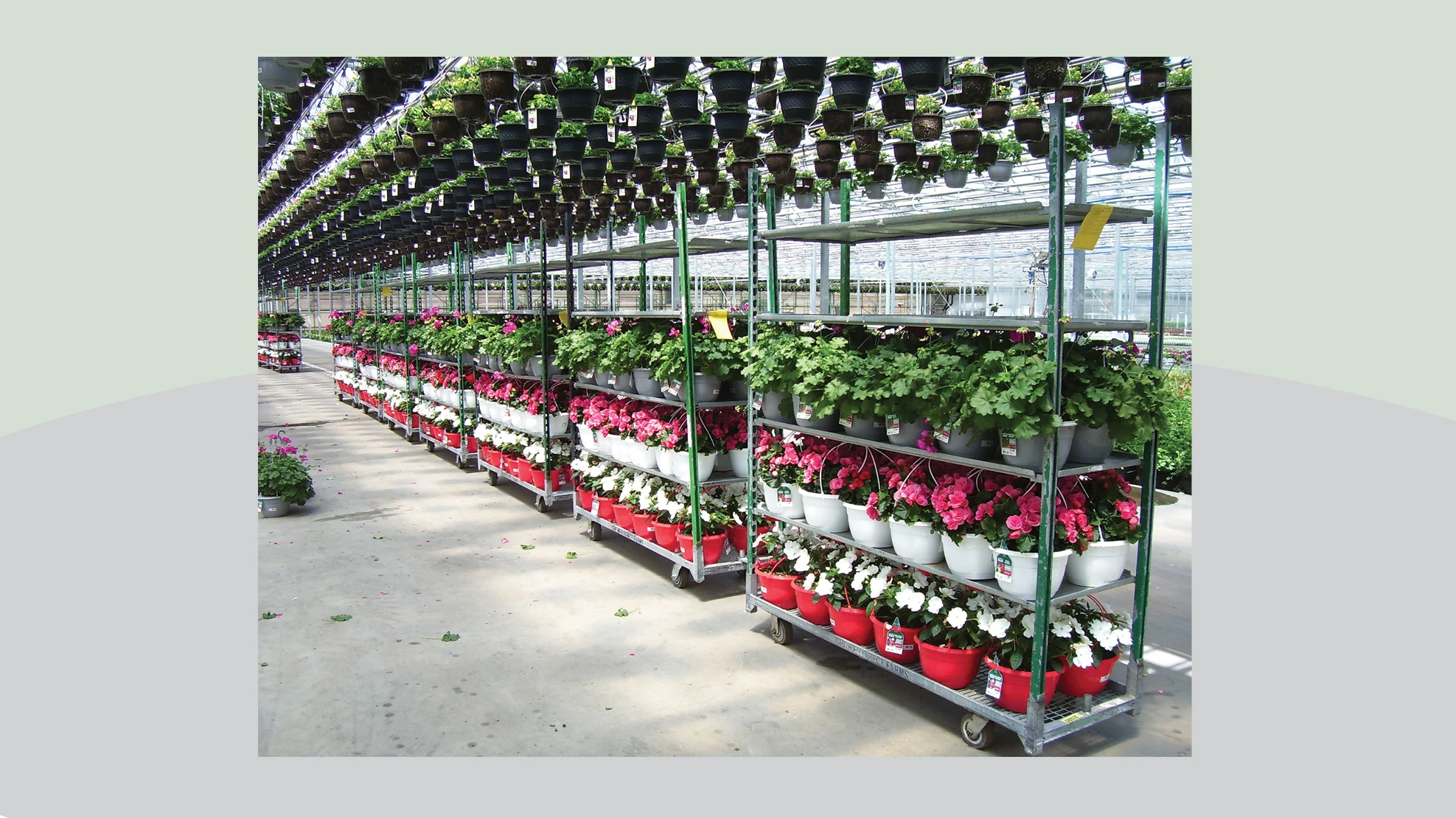
A conversation with Jim Berry is filled with easy laughter, gratitude and lots of wisdom about people, plants and living life with courage and grit. With half a century in the horticulture industry, he’s left an indelible trail of plants he’s touched and lives he’s influenced. But Jim’s path to the success he now enjoys as co-owner and president of J. Berry Nursery wasn’t straight or smooth.
Jim’s story started in North Central Texas on his family’s diverse farm. The Berrys ran some cattle and farmed cotton and peanuts alongside crops such as watermelons, pecans, black-eyed peas and sweet potatoes. The nine siblings pitched in on whatever needed to be done.
“My dad taught us to always do the right thing and don’t give up. Give it your best effort and have confidence in who you are,” Jim recalls. “Even though he was just a farmer, he was a dang good farmer. He encouraged his kids to think outside the box and take the road less traveled.”
When the time came for Jim to go to college, agriculture was the obvious choice. Jim jokes he chose horticulture for two reasons: “I enjoyed the watermelon, pecans and sweet potato aspects of what we did — and that’s the only time I saw cash in the family.” But money didn’t drive his decision. “I honestly enjoyed horticulture more than the other agronomic or livestock aspects,” he says.
Jim started at Tarleton State University, got his bachelor’s degree at Texas A&M, then studied for a master’s at the University of Arkansas. Even in those early years, he displayed the confidence and determination that define his horticulture career.
Dr. David Creech, professor emeritus at Stephen F. Austin (SFA) University and director of the SFA Gardens, remembers his 1960s Texas A&M classmate — a fellow rebel in the horticulture club who shared his curiosity for plants.
“Jim went into the industry, and I went into academics. We’ve stayed friends for 50 or 60 years,” David says. Referencing the peaks and valleys Jim endured in those decades, David is succinct: “He’s a real survivor.”
A home and a mentor
After college, Jim worked in the vegetable industry before landing a propagator position at Greenleaf Nursery in El Campo, Texas. During his four-plus years there, he made his first mark in the nursery industry. As his horticultural inclinations combined with master’s studies in plant breeding, he excelled at propagation. “At Greenleaf, I was such a newbie that I just executed the plan,” he recalls. But that work set the course for what would follow.
From Greenleaf, Jim went to Hines, a Houston startup at the time. A year or so later, he left Texas for Alabama’s Flowerwood Nursery, where he stayed for 25 years. At Flowerwood, he found a home for his talents and a mentor who still resonates.
“Mr. Sidney B. Meadows with Flowerwood Nursery mentored so many,” Jim recalls. “He could have been governor. He could have been senator. He was a psychologist; he was a salesman; he was a public speaker; he was a life coach. He was just inspiring and built others up to their potential.”
At Flowerwood, Jim was first able to express himself through multiple aspects of the horticulture business. “I had the science of plant production down to a pretty high level, and I had competent staff at Flowerwood,” he says.

And that paved the way for further success. “God puts great plants in my way, and I take notice and bring them to market,” he says.
Jim’s achievements didn’t surprise his college chum. “I think he has real good business sense, but underneath the whole thing — what I think a lot of people miss about him — he’s really a plantsman. He’s kind of a geek,” David says.
Shoved through a door
Look around J. Berry Nursery today, and it’s easy to assume the nursery’s founding in 2006 was a long-time dream of nursery ownership come true. But Jim is quick to correct — that was never his dream. “Every nursery that I’d worked at, I took possession psychologically,” he says. “I took ownership in my responsibilities.”
But change came — swift and unexpected — when he was fired from Flowerwood’s Plant Development Services. “God shoved me through that door and I’m so thankful,” he says.
That’s when his son Jonathan, now J. Berry Nursery co-owner and vice president, came forward. “He was the driver for me,” Jim remembers. “He said, ‘Dad, Let’s do something together.’ I wasn’t afraid. He wasn’t afraid. I had that level of confidence in myself and in my son.”
And so a business partnership and a business plan were born.
The pair settled on a site in Grand Saline, Texas, with all the necessary ingredients for success. And J. Berry Nursery launched with Home Depot as its first customer.
“My previous history had impacted Home Depot fairly significantly, so I had a notoriety and a reputation — good or bad, depending on who you ask,” Jim says, with a chuckle.
Then, he was granted a license to propagate Knock Out roses, one of the hottest plants and biggest sellers in the market.
When the recession hit only two years after opening the Texas site, J. Berry Nursery stayed the course, unaffected by the housing market collapse and subsequent loss of landscape business many growers struggled through.
“I never had a landscape supply business, so when housing collapsed, I didn’t miss that. I had the Home Depot market and people were still value-shopping. So, I had the right product, in the right economy, with the right customer,” Jim recalls.
But struggles still came. Oversupply hit the Knock Out rose market in tandem with the recession, and Jim wondered at times how they’d make payroll or pay the bills.
“Those were scary times,” Jim says. “But I’ve had committed friends and partners that stood behind me, and for that, I am forever grateful.”

Then J. Berry’s focus on R&D and diversification took on added importance for its future.
Disrupting markets and marketing
J. Berry Nursery was founded to bring innovative, high-value plants to market.
“That was what I felt like my ability was and that’s where the opportunity was,” Jim says.
Marketing and market disruption have figured largely in the nursery’s success.
Jim recalls the Flower Carpet program of the late 1990s, calling it “an opportunity to get a master’s degree in horticultural marketing.” With its pink pots and proven marketing strategy, the program taught Jim he had a knack for plant marketing.
A defining moment came when Jim heard Dr. Lowell Catlett, an ag economist and futurist from New Mexico State University, speak 20 years ago.
“He told a group of nurserymen that the market is fluid and that change is accelerating. That really weighed on me,” Jim recalls. “So, if the market is fluid, do I want to respond to the changing market? Or do I want to cause the change? So, I set out to be a market disruptor.”
From the beginning, J. Berry Nursery invested heavily in research and development, yielding industry-changing brands like Black Diamond Crapemyrtles, Déjà Bloom Azaleas and Hollywood Hibiscus. While marketing plays a huge role, that’s not where it starts.
“I first start with science,” Jim says. “I’ve got to have a plant that is extraordinary.” And the consumer is always in mind.
“Whoever’s buying our plants needs to have more success — more beauty, fewer costs, longer value, fewer chemicals to apply,” he continues. “If the grower finds these plants to be easier to grow and more beautiful, the homeowner is going to do that, too. And if I truly keep that consumer in mind, then there will always be a market for J. Berry plants.”
The nursery’s business model moving forward calls for its income to be balanced between finished product and licensing of intellectual property, brands and plant patents.Though it’s not there yet, it’s well on its way.
Joy in those he leads
In Jim Berry’s eyes, requirements for leadership are straightforward: You’ve got to have a vision, know your field of expertise and be able to teach it by elevating those you lead.
“I’m very proud of my development of talent over time. A lot of nursery professionals that have made a mark with their own career, I can look back with pride that maybe I helped them get where they are,” he says.
When asked about his team, Jim starts with Jonathan: “He’s an inspiration to me. He’s so focused and so dependable and so smart. And he is a model for my whole team. Basically, Jonathan answers to me and then everybody else in leadership answers to him. So he is a seasoned business owner and a darn good nurseryman. We’ve done this together.”
Jim speaks with appreciation and pride about J. Berry’s many dedicated, long-term employees, as well as his young team of hires (highlighted in Nursery Management’s January 2022 issue). “Some of them are going to be movers and shakers for a long time in our industry,” he adds.
James King, operations manager at J. Berry, remembers interviewing for a position as head grower in 2008. With a tree background and no shrub experience, he still got hired. “Jim gave me a chance. I’ve learned everything I know about shrubs, literally, from Jim Berry,” James says. “He’s a mentor to me. I’m still learning from him.”
James describes a work environment where respect for and from employees goes both ways, where integrity, real caring and working side by side are the norm. “Jim’s real personal — he’s out there nearly every day talking with everybody, spending time with us and walking the crops, teaching us what he’s learned,” he says.
David also expresses regard for Jim’s management style.

“He gives them leadership and he gives them compliments … He basically tries to prop people up and give them an opportunity to make a show for themselves,” he says. “He’s not just a great nurseryman and a great manager, but he’s also a real good human being. I’ve always admired that. He takes great joy in his staff and them excelling, and that’s kind of a rarity. That is probably his real strength at J. Berry Nursery.”
Much more ahead
Beyond horticulture, Jim enjoys travel and cooking. Word has it his gumbo is the best around. And with anything that goes on a smoker, he’s hard to beat. But he doesn’t plan on retiring to hone his cooking skills anytime soon.
“Here’s when I’ll retire: When I’m physically or mentally not able to work or if I don’t enjoy working anymore. If I’m detracting from the value of the company, I should leave. And — I hope this will never come to pass — that I’m not wanted at the company,” he says, chuckling again. For now, he’s right where he wants to be, doing exactly what he wants to do.
Looking back on his accomplishments, Jim acknowledges being responsible for propagating millions of useful plants and transforming markets, multiple times. But he gives credit to those who’ve influenced, enabled and supported him — especially his wife, Martha.
“I’m just blessed to have had the life that I’ve had,” he says. “I would encourage people. If I’ve traveled the world — and I have — you can, too. So don’t be afraid. Go through open doors. If you are content where you are, that’s where you will stay. But if you aspire, you’ve got to be courageous.”
Reflecting on Jim’s HILA award, Jonathan says his father has always challenged the status quo in life and in business.
“This mindset is pervasive throughout our business and is clearly articulated with our core values of leadership, innovation, integrity and resilience,” Jonathan says. “His leadership has positioned our company as one that is known for innovation, especially with new product development and marketing. This award is a fitting recognition of his remarkable career as a mentor, leader and market disruptor.”

Explore the July 2022 Issue
Check out more from this issue and find your next story to read.
Latest from Greenhouse Management
- Society of American Florists accepting entries for 2025 Marketer of the Year Contest
- Sustainabloom launches Wholesale Nickel Program to support floriculture sustainability
- American Horticultural Society welcomes five new board members
- Color Orchids acquires Floricultura Pacific, becoming largest orchid supplier in U.S.
- American Floral Endowment establishes Demaree Family Floriculture Advancement Fund
- The Growth Industry Episode 3: Across the Pond with Neville Stein
- Flowerful growth
- The Growth Industry Episode 2: Emily Showalter on how Willoway Nurseries transformed its business






